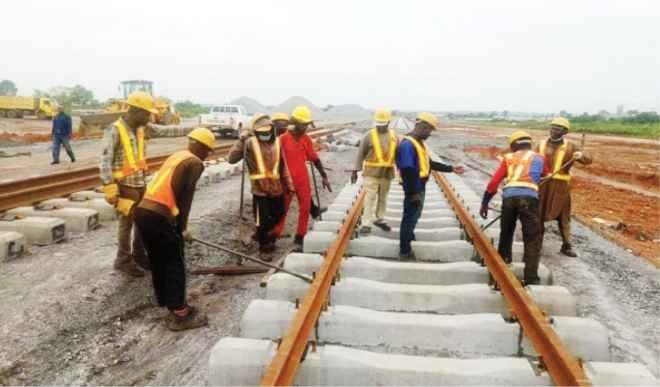On 17th May, 2019, Mr. Rotimi Amaechi, Minister of Transportation, on behalf of the Federal Government, issued an award for a $3.9billion contract to link Abuja (Idu) with the Itakpe-Warri rail line. The facility would terminate at the Warri Sea Port. The contract scope includes the construction of a new deep sea port in Warri, and is scheduled to be completed in 2024. You will forgive Nigerians if they are unable to appreciate the revolutionary significance of this step: they have heard innumerable pronouncements by politicians in government that ended up as a pipe dream.
If you recall that similar public cynicism greeted and trailed the first ground-breaking step in rail transport infrastructure by Mr. Amaechi a few years ago, specifically with respect to the award of the double track, standard gauge Lagos-Ibadan sector of the Lagos-Kano rail initiative, you will understand perhaps, why this audacious Abuja-Itapke-Warri standard gauge contract award is drawing everything but public celebrations. When he announced the award in 2016, as he did in this recent pronouncement, there were actually public jeer and cynical dismissal of the administration’s ploy to ‘spend its way out of recession.’
Three years on, we’re now in the completion stages of the 156.5km contract. This would be the first administration in Nigeria that began a rail project from conception to the finish line. What am I driving at? I’m not a politician, neither a media publicist. I have been closely associated with the current work to overhaul and transform the railway infrastructure in Nigeria. I am a banker and have been involved with the China Railways Construction Company International (CRCC), one of the companies involved in the overall processes for the delivery of this key infrastructure.
In the past three years I have been involved in several travels both to China and elsewhere in respect of the concerted push by all the parties to deliver on this fundamental infrastructure requirement. I have also toured sites and have been part of the evaluation and bid preparation visits, contract negotiations and several technical and financial features of the project design. As it relates to the development of the railway sector, something that struck me in all these is Mr. Amaechi’s remarkable performance in the negotiations. He pushed the Chinese to accept critical add-ons to the main project at little or no escalation of cost outlay.
For instance, the Itakpe-Ajaokuta-Warri railway Standard Gauge project, which was commenced over 30 years ago and only completed by this administration in 2018, evidently bolstered the Minister to offer the Chinese further contract to extend the rail lines at both ends, stretching its northern end to Abuja and its southern end terminating at the Warri port. He pushed for an add-on facility that amounted to building a new deep sea port in Warri. Mindful that the standard gauge Lagos-Ibadan-Kano stretch of the railway infrastructure is almost through and dusted, it would be understandable why Mr. Amaechi was leaving nothing to chance to put the twin infrastructure base of the Abuja-Itakpe-Warri and a deep sea port as the next necessary thing.
To ensure that the expanding railway infrastructure base for which this administration wants to deploy in re-mapping Nigeria’s economic landscape is on track Mr. Amaechi actually tied this with a concept for a feeder university education and research facility serving the technical and manpower needs of the sector. So named the Transport University, the faculties will be dedicated to railway engineering and research and there is ongoing consultations between Amaechi’s team and the Chinese officials which expectedly would culminate in the signing of an MOU between both countries.
Railway technology is considered unique and special requiring more than general engineering acumen to deliver operational consistency and expertise, something the Chinese have become very adept at and for which Nigeria stands to benefit from on account of this partnership. The partnership which places the obligation on the Chinese government to award scholarships to 100 Nigerians to study Railway Engineering to post graduate level in China in the interim will be part of the preparatory ground for the overhaul of the railway sector in Nigeria. Whilst the foregoing vision is steadily unfolding, the Minister was busy vigorously expanding on it. His team has been quietly working with the Chinese company manufacturing locomotives to set up an assembly plant in Nigeria not only for the needs of the rapidly deepening railway transport ecosystem in Nigeria but as an African market hub to serve the rest of the sub Saharan territory. The driving vision, which one cannot but commend, is to have Nigeria develop the capacity to be able to construct its own rail line in no distance future.
Essentially, the re-mapping of Nigeria through rail is an ambitious work to re-cast the country in the matrix of an economic power connecting commercial hubs, agrarian territories, manufacturing zones as well as innovation hubs in Nigeria seamlessly through rail. It is a vision that already sees Nigeria flourishing with multiple deep sea ports across the massive stretch of shorelines running from the Bight of Benin to Lagos and connected seamlessly by railways across other territories of economic activities in the hinterland and further into the north.
In summary, this article celebrates the vision as well as the arduous work going on to give Nigeria a fresh start with rail infrastructure. The Lagos-Kano standard gauge rail takes care of a vital artery in this design and is currently nearing the finish line. The Abuja-Itakpe-Warri standard gauge line is on course with add-ons that make a further economic statement such as new Warri deep sea port, University of Transport. There’s also the rehabilitation of the narrow gauge lines such as the Port Harcourt-Enugu-Maiduguri lines. Although no major push has been given to the previously mooted 1,402km rail infrastructure from Lagos-Benin-Port Harcourt-Calabar rail line but it goes to highlight what the future holds with this team on the saddle.
Dahiru, a banker and entrepreneur, lives in Abuja.

 Join Daily Trust WhatsApp Community For Quick Access To News and Happenings Around You.
Join Daily Trust WhatsApp Community For Quick Access To News and Happenings Around You.


